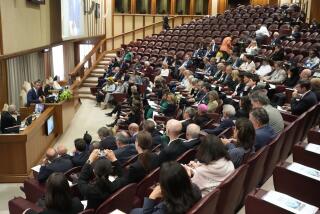Seeking a moral route to economic health
- Share via
In the midst of a global recession, religious leaders are looking beyond the recent regulatory fixes and bailouts aimed at repairing an ailing financial system.
They are questioning the underlying assumptions of a market economy that they say has lost its moral bearings.
Last week, Pope Benedict XVI issued an encyclical, a papal pronouncement, that decries the divide between rich and poor.
He said that growing financial interdependence had not been matched by ethical interactions for the good of all and that the United Nations and financial institutions should be reformed so that a “true world political authority” can work for the common good while respecting local decision-making.
“The church does not have technical solutions to offer and does not claim to interfere in any way in the politics of states,” the pope wrote. It “does, however have a mission of truth to accomplish. . . . Fidelity to man requires fidelity to the truth.”
The archbishop of Canterbury, speaking Wednesday in Anaheim at a national convention for Episcopalians, criticized those who profit by manipulating markets and fashioning exotic financial instruments on a house of cards.
“In the last six to nine months, what we have seen in our world is not simply an economic crisis but a crisis of truthfulness,” said the Most Rev. Rowan Williams. “We have suddenly discovered that we have been lying to ourselves.”
Williams, the leader of the Anglican Communion, said that the world can’t return to a “dysfunctional, disabling and destructive” financial system and that the demands of the market are never a satisfactory moral guideline. He called for factoring environmental costs into the equation.
“The economy is a wholly owned subsidiary of the environment,” he said.
Together, Roman Catholics and Anglicans make up about 58% of the world’s estimated 2.1 billion Christians.
The declarations by these and other church leaders came as the world’s major economic powers met in Italy to come up with a shared response to the global downturn and to climate change. Only marginal progress was achieved.
Given the initiatives of government and the influence of multinational corporations, one might wonder if religious bodies can have any effect.
Will they be heard outside the cloister, or even by their own congregants, whose lifestyles for the most part are not unlike those of people who are not members? Is anyone really listening?
It would be easy to take a jaded view. Twenty years ago, the Episcopal House of Bishops -- one of two houses in the church’s highest legislative body, General Convention -- issued a paper on “Economic Justice and the Christian Conscience.” In it, the bishops urged a “fundamental reordering” of human values.
In 1986, Roman Catholic bishops in the United States issued a pastoral letter, “Economic Justice for All,” that called for a moral examination of the economy and raised the ire of both the Reagan administration and prominent lay Catholic conservatives.
As for Pope Benedict’s latest call, he noted that the idea of a world political authority working for the common good was first broached by Pope John XXIII, who died in 1963.
To be sure, religious groups of all kinds devote money and talent to serving the poor and working to alleviate poverty, racism and economic disparity.
They play a role in founding hospitals, schools, and colleges and often support groups pushing for higher wages for the working poor.
Some say that elected officials who have religious affiliations bring to office a moral grounding that can positively influence public policy.
Richard Parker, a professor of public policy at Harvard University, said that religious voices may have a role to play in shaping responses to the current financial crisis. Popular outrage over Wall Street swindlers and the loss of jobs, homes and retirement savings have again brought moral issues to the forefront of public debate.
“People today are desperately hungry for what I can only describe as moral leadership -- not moralistic leadership but moral leadership,” said Parker, the son of an Episcopal priest, in an interview before he addressed a small group at the Anaheim convention.
“We’re living in a period of gross, and one might even say grotesque, market failure,” he said.
Speaking in a similar vein, Episcopal Presiding Bishop Katharine Jefferts Schori joined Williams, the archbishop, at a forum on the Christian faith in during the global economic crisis on the first night of the convention, which runs through Friday.
“We are in the midst of a crash course in economic inter-connectedness,” said Jefferts Schori, adding that the excesses unveiled by the economic crisis “have been biblical in scale.”
“We have overlooked the greed that engendered this crisis, we have participated in it ourselves through investment policies. . . . We have ignored the abundance with which God has blessed us and been unwilling to share what we know and what we have,” she said.
Williams told the session, attended by several hundred people, that the implicit lies leading to the economic crisis require a moral response.
He also said those untruths included a belief in unlimited growth on a planet that has limits.
Individual lifestyles and government policies must change to show respect for a finite material world and for the common good, Williams said.
“The task before us is not simply to restore financial stability,” the archbishop said. “It certainly is not to get our international financial life back to normal. There is no normal anymore.”
--
larry_stammer@yahoo.com
More to Read
Sign up for Essential California
The most important California stories and recommendations in your inbox every morning.
You may occasionally receive promotional content from the Los Angeles Times.













